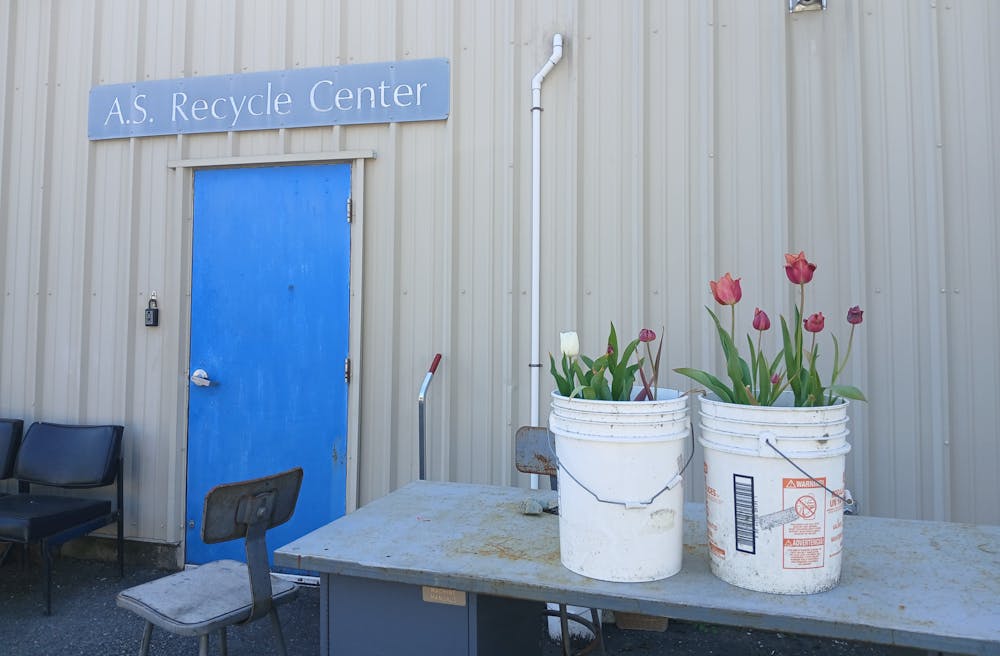On Monday, April 14, Western Washington University’s Facilities Development & Operations (FDO) implemented an emergency interim recycling plan following an assessment of the student-run Recycle Center’s six vehicles, five of which were deemed inoperable. Western’s existing trash and compost provider, Sanitary Service Company (SSC), will now provide recycling services.
Recycle Center employees said issues with their vehicles have existed for years, and both informal and formal requests for maintenance trace back to before Facilities Development & Operations took on management of the center in fall 2024.
One truck with broken brakes was held in the autoshop. Another’s liftgate was broken. Another would “die on you while you were driving it,” said Sahara Valentine, who has been a Recycle Center employee since fall 2023 and became a non-temporary operations manager this quarter.
“Since a year and a half ago, our [repair] requests started being ignored,” Valentine said. “All of our student workers … felt put in a very hazardous position driving these vehicles that were really old.”
As of April 25, no Recycle Center employee or other individual has experienced injury due to the operation of an unrepaired vehicle.
“We felt an accident was inevitable,” said Olivia Isenhower, staff manager of the Recycle Center.
At one point in February, the three operable flatbed trucks had to be dedicated to multiple types of recycled material.
“Because we were running at half capacity, we just had recycling piling up in the yard, and we were not able to do our jobs efficiently or fully, which is something we really pride ourselves on,” said Lily Howard, a general laborer at the Recycle Center.
General Manager Richard Neyer has worked at the Recycle Center for 35 years, since he was a student at Western.
We’ve always asked for them to purchase us another, newer vehicle, and the answer would always be that they don’t have the funds to, Neyer said.
The Recycle Center’s two leased vehicles slowly degraded over the past two years, though many of their vehicles have been in operation for multiple decades now.
“That’s how we ended up with a bunch of old trucks, because we didn’t get [financial] support from the university to lease additional vehicles. That’s over 30 years,” Neyer said.
Recycle Center employees typically collect an estimated 4,000 pounds of recycled material daily. Now, that number has been reduced to zero, and their employees’ hours have been reduced significantly as the evaluation of their vehicles continues.
“In some cases, parts are hard to come by and repairs have been challenging. In other cases, replacement is the only option. However, due to budget constraints, full replacement is not an option,” said Jeff Aslan, assistant director of Campus Utilities & Sustainability.
A high-priority repair of one vehicle was recently completed, though Aslan estimates replacement would cost $80,000 for each flatbed truck and about $300,000 for modern garbage trucks.
Facilities Development & Operations is actively determining what work the Recycle Center can do with limited vehicles and “would like to leverage their expertise in recycling services to make sure the interim plan is successful,” Aslan said.
The Recycle Center plays a large part in meeting the waste reduction and sustainability goals outlined in Western’s Sustainability Action Plan, adopted in 2017.
Kate Beck is the Sustainability Action Plan Implementation Manager at the Sustainability Engagement Institute (SEI). She said in an email, “Waste reduction education is critical to ensuring our waste, recycling and compost streams are uncontaminated.”
The Recycle Center and SEI collaborate to conduct waste audits and provide waste sorting education through the Zero Waste Western program.
“Reduced consumption of waste-generating goods and services and waste diversion is an important way to reduce WWU's scope [three] emissions,” Beck said.
Scope three emissions are those emissions that come from assets neither owned nor controlled by Western and are not able to be adequately tracked by Western’s existing greenhouse gas methodology.
As the interim recycling plan continues throughout spring quarter, the SEI anticipates soon receiving recycling-related data from SSC, since the SEI already receives landfill and food plus data from SSC, Beck said.
“We would like to have regular collection resume as soon as possible,” Aslan said. “We have crews deployed to deal with overflows.”
Overflows of recycling have remained a visible issue across campus, even as the interim recycling plan goes on almost two weeks.
Community members are encouraged to report overflows to FDO customer service either via email, at fixit@wwu.edu or via their customer service center at 360-650-3420.
Josh Hernandez (he/they) is a campus news reporter for The Front this quarter. He is a third-year journalism news/ed major. Outside of journalism, his other interests include literature, geography, and music history. You can reach him at joshhernandez.thefront@gmail.com.






